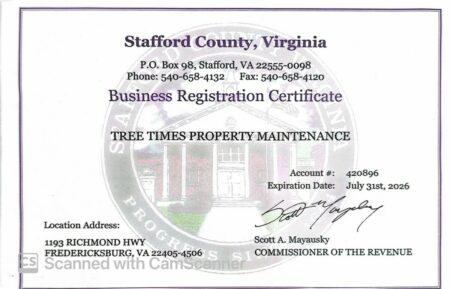All Insurance is created equal.
Fact: Insurance in the tree industry is very expensive, especially workers’ compensation. Companies often do not carry proper insurance to protect you from liability, and some will stretch the truth to convince you everything is covered when they are under insured and many are unaware of what coverage is needed.
Remember, where a lot of money is involved, there is a lot of motivation to bend the truth. Do your own research and get certificates of insurance directly from the insurance company. No one should ever be offended or hesitant when you ask for proof of insurance!
It is much cheaper simply to print “fully insured, workers’ compensation and liability insurance” on a card or ad than it is to buy coverage. This deception is made especially easy and profitable because very few customers actually check to see if insurance is in place until after an accident happens. Please do your homework and ask your lawyer.
Insurance Definitions:
Workers’ Compensation is the most expensive and the most necessary insurance. It covers injuries that tree company employees or owners suffer at work. This is the only real protection you can have from the liability of someone being injured while working on your property. There is no substitute for it!
Without workers’ compensation, tree companies are still legally required to take responsibility for work injuries, but you-the property owner-are next in line. If you hire a contractor who has no workers’ compensation, you must pay the bill if an employee is injured and the owner can’t pay it all. You may sue the contractor to recover damages, but meanwhile you have to pay for the injured person’s medical bills, lost wages and other costs associated with the injury. Needless to say, it’s no fun.
Workers’ comp tricks to watch out for:
- Some tree contractors claim they do not need workers’ comp because they have fewer than five employees. It is true that the law doesn’t require workers’ comp for non-construction businesses with less than five employees. But that will come as little comfort when liability bounces straight to you after the company owner is or claims to be unable to pay for the injury of a worker.
- Another myth you may hear is that workers’ comp is not needed if the owner is the only employee. If the owner is injured and can’t pay, you are just as liable. Additionally, no one should ever do tree work alone, as this greatly increases the chance of severe injury or death.
- One trick is to carry workers’ comp on only one employee working at least 20 hours a week. This saves a tree company huge amounts if it employs several workers because workers’ comp premiums are based on pay role. A valid insurance certificate is meaningless if most employees are being paid “under the table” as subcontractors with no insurance.
General Liability Insurance protects the customer’s property. It would pay, for example, to repair the damage if a tree fell on your house. General liability covers neither injuries suffered by tree workers nor accidents involving any on-road vehicle. For instance, if someone fell from a tree and broke his back on your property, general liability offers no protection. (Some policies do have a rider covering $5,000 of on-the-job injuries. But as you probably know, a single visit to the emergency room can far exceed $5,000.) Also, if someone were to back a truck into your house or collapse your septic tank, general liability would be of no help.
Bonded: A bond is a written guarantee backed by a financial institution to ensure a job will be completed. Bonding is generally used only for large projects such as contracts with VDOT or Virginia Power Company. For a bond to mean anything, the customer must have a valid copy of it. If a company claims to be bonded but does not give you a copy of it for your specific job, being “bonded” offers you no protection at all.
Automobile Insurance covers damages resulting from accidents involving on-road vehicles of any kind. Commercial auto insurance has exclusions for auto accident injuries to employees or owners at work, since workers’ comp is designed to cover these injuries. This can be important to remember if someone has an accident involving a truck on your property.
Fully Insured: In the phone book you will see many advertisements with the term “fully insured.” What does it mean? More often than not, it means a tree company does not have the insurance you need and doesn’t want you to ask many questions. You must ask, however, because “fully insured” can easily mean absolutely nothing.
Besides understanding the insurance terms, don’t forget to finish your homework:
- Check with the Better Business Bureau to see if the business has received complaints, and how the problems were rectified.
- Get reference checks on the tree company in question. Reputable businesses should be willing to provide you with customer references.
- Always deal directly with the insurance company that underwrites the policy. Never rely on the tree company’s copy of a certificate. Some pay only the first payment on their insurance policies and let them expire, passing off copies of the expired certificate as valid.
Example Tree Accident Case:
Two tree workers are removing a tree in your backyard one of them gets in the truck and pulls it and the trailer behind it forward, he does not see that the other worker is between the truck and trailer. When he pulls forward the employee behind the truck is knocked over and crushed by the trailer. In a panic the driver backs up and hits the brick wall of the house doing $2000.00 of damage to it.
Who pays?
The owner of this company only has the truck and trailer as his assets which are worth $8,000.00. He rents his house and has no savings or retirement. The company does not have auto insurance or workers commensuration but does have general labiality insurance. General liability insurance will not cover any of the costs of the accident because it involves an on the road vehicle. The hospital bills for the injured employee total $35,000.00, lost wages total $20,000.00 and the repair of the wall is $2000.00 for a total bill of $57,000.00.
This is what will most likely happen; the home owner will get the following letters in the mail:
- A letter forms the general liability company explaining that they are not responsible for the damage done to the wall because the accident involved an automobile.
- A letter from the home owners own home insurance company stating that they will not pay for any damages done to the house or any of the medical bills associated with the accident, because the home owner was responsible for making sure the tree company had all the proper insurance before the job was started. In most cases home owner insurance policies do not protect home owner from this liability, most policies will state that it is your responsibility to check and confirm that companies you hire to work on your property have liability insurance and worker compensation insurance. If you fail to do this you are responsible for any damages done to your property or injuries that occur during the course of work.
- A letter from the lawyer for the injured employee stating that the owner of the company has filed bankruptcy and has only paid $3000.00 toward the employee’s injuries and that a court date has been set for a civil suit to collect the reaming $54,000.00 plus legal fees. It should also be noted that there is very little defense to this type of law suit.
*** If the tree company had auto insurance then the wall that was damaged would have been covered. If the company had workers’ compensation in place then the employees injures and lost wages would have been covered. This would mean that the home owner would not have been financially liable for the accident. ***










